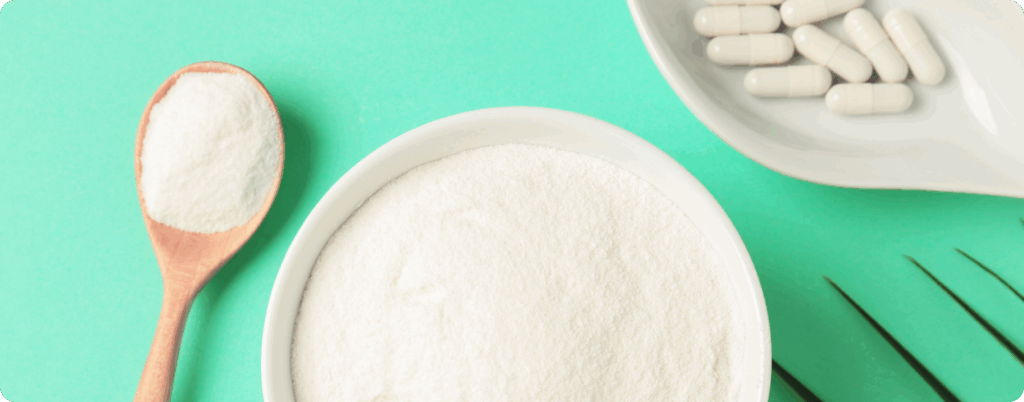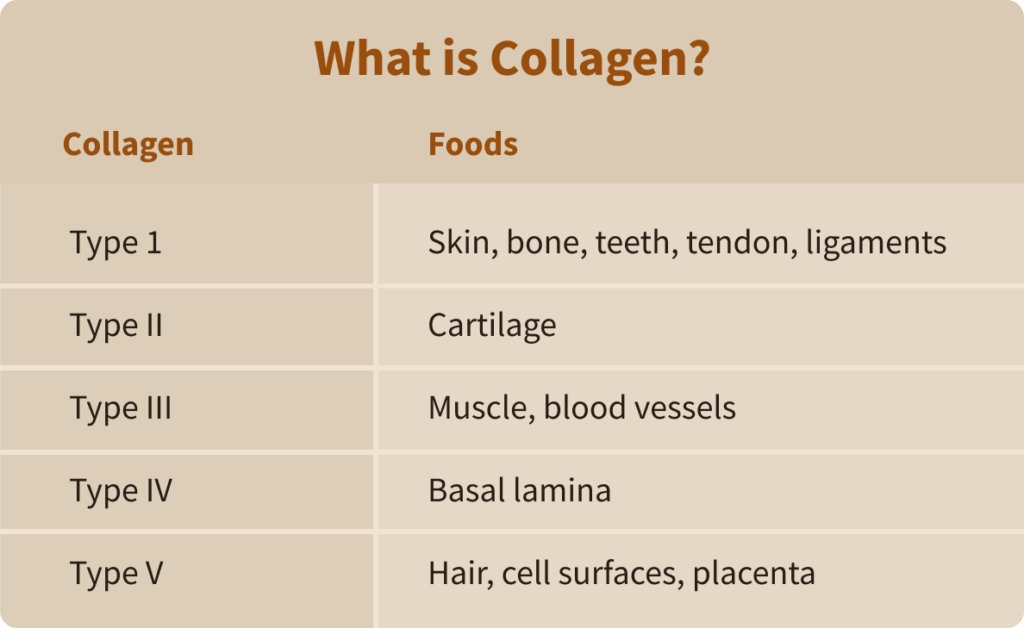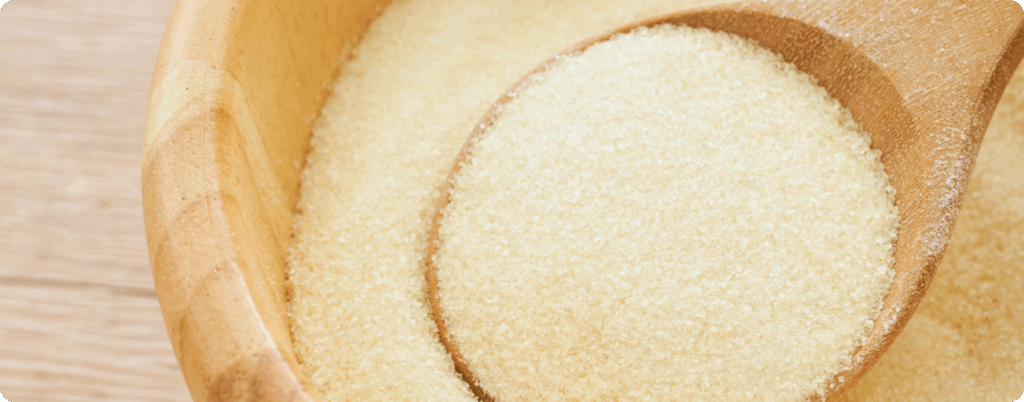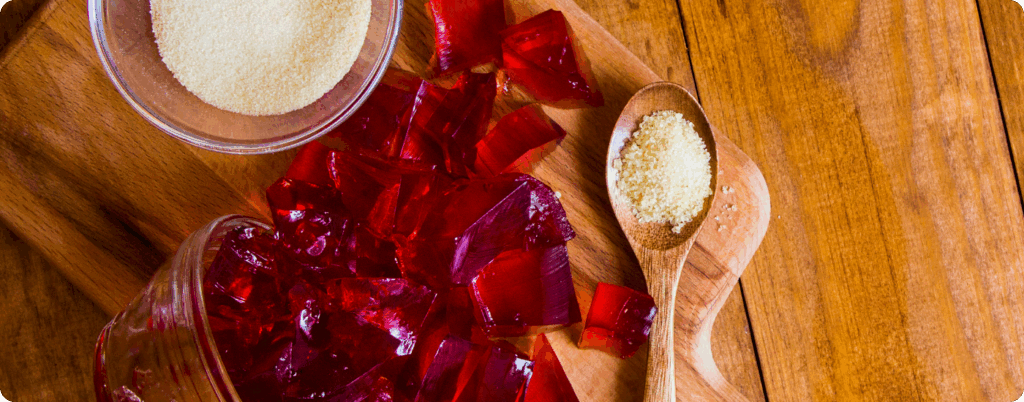PLEASE NOTE: The information in this blog is for educational purposes only. It is not a substitute for professional medical advice. Consult your healthcare provider if you’re seeking medical advice, diagnosis, or treatment.
You can now find countless supplement options claiming to improve skin health, gut health, and joint health. While most of these claims fall short, collagen and gelatin have emerged as two of the most promising options, praised for their potential benefits ranging from joint health to skin improvement.

Despite their popularity, many people remain confused about the relationship between these two substances and which one might be better suited for their needs.
Understanding the gelatin vs collagen debate requires an examination of their similarities and differences, as well as their respective benefits and applications. While gelatin and collagen share a common origin and many overlapping properties, they have distinct characteristics that make each suitable for different purposes and preferences.
The choice between them often depends on individual health goals, dietary restrictions, and practical considerations like preparation methods and taste preferences. Let’s take a closer look at which option is right for you.
What is Collagen?
Collagen is the most widespread protein in the animal kingdom and is found in bone, cartilage, skin, tendons, and other connective tissues (1). It is also the most abundant protein in the human body, comprising approximately 25-30% of total body protein and serving as the primary structural component of connective tissues (2).
Collagen offers a high concentration of glycine, proline, and hydroxyproline, three amino acids that are responsible for its structure (3). The most common collagen sources are bovine collagen (from cows), marine collagen (from fish), pork, chicken, and there are 29 known types of collagen (4, 5).

The human body naturally produces collagen through a process involving multiple nutrients, including vitamin C. But, collagen loss in the body begins at age 18, and by age 40, you may lose about 1% per year (6). By the age of 80, collagen production can decline by 75% compared to that of a young adult.
Yet, collagen is vital for organ development, wound healing, cornea and scalp repair, immune system function, and blood vessel and bone reparation (7, 8). Collagen supplementation may also offer other impressive benefits, such as:
- Muscle gain and improvements in body composition (9, 10).
- Speeding up wound healing, improving skin hydration, and reducing wrinkles (11, 12, 13).
- Promoting nail and skin health (14).
- May improve digestive symptoms such as bloating (15).
- May improve mobility, reduce stiffness, and reduce joint pain (16, 17).
While the daily intake of collagen may depend on your specific needs, studies have shown benefits ranging from 2.5 to 15g of collagen peptides per day (18).
Gelatin 101: Overview & Benefits
Denatured collagen, known as “gelatin”, is typically sourced from animal bones, skin, or connective tissues (19). Unlike collagen, which is naturally found in the human body, gelatin needs to be hydrolysed (broken down) from collagen (20).

Gelatin’s most distinctive characteristic is its ability to form gels when mixed with liquid and cooled, a property that collagen lacks. Gelatin powder is especially useful in food preparation, from traditional desserts to modern health-focused recipes. The substance also acts as an effective thickener, stabilizer, and texturizer in various food products (21).
Like collagen, gelatin provides high concentrations of glycine, proline, and hydroxyproline, along with other amino acids essential for connective tissue health (22). Gelatin can also offer a variety of unique benefits, such as:
- Gelatin can accelerate wound healing (23).
- Glycine, an amino acid found in gelatin, may support better digestive health and sleep (24, 25).
- Exercising after consuming gelatin may lead to increased collagen synthesis and may benefit injury prevention and tissue repair (26).
Gelatin vs Collagen: What’s the Difference?
While collagen and gelatin originate from the same source, the processing methods used to create each product result in different characteristics and applications. Gelatin vs collagen can be understood thanks to these key differences.
Structure
The primary difference between gelatin and collagen is in their structure. Native collagen maintains its triple-helix configuration, while gelatin loses this triple-helix structure (27).
Solubility
Collagen peptides dissolve easily in hot or cold water, while gelatin requires warm water and will turn into a gel once cooled.
Cost
Gelatin powder is generally cheaper than collagen supplements, but collagen products tend to offer greater convenience and versatility.
Scientific Evidence
Collagen has been studied extensively in over 20,000 studies with a heavy emphasis on joint function, bone health, and skin health (28). Gelatin research is less common, but it is centered around traditional uses, gut health, and even sleep quality.
Culinary Use

The gelling properties of gelatin make it valuable for bone broth, gummies, healthy desserts, and as a natural way to thicken soups and sauces.
The Best Ways to Add Collagen & Gelatin to Your Diet
Both collagen and gelatin can be used in a variety of creative ways. Here are 4 of the most popular options:
- Add to Your Favorite Drinks: adding collagen powder to your morning coffee, tea, protein shake, or smoothie is a simple way to add nutritional value without a negative impact on taste or texture.
- Baking: when mixed with liquid and cooled, gelatin can form gels that are useful for traditional desserts, gummies, and various other health-focused recipes. The nutritional value of soups, sauces, and stews can also be enhanced by adding gelatin.
- Eat Collagen Rich Foods: both collagen and gelatin can also be found in a variety of nutritious whole foods. Primarily coming from animal sources, gelatin and collagen can be found in bone broth, eggs, meat, seafood, dairy products, and organ meats.
- Supplements: gelatin and collagen can both be found in a variety of convenient, easy to use forms such as powders, capsules, or even infused into coffee, yogurt, tea, or water.

With so many options to choose from, there are two main concerns to pay attention to.
The first is the source of your collagen or gelatin. Given that most collagen and gelatin products are sourced from beef, fish, or poultry, there is the possibility of allergic reactions or running into religious constraints (29).
Collagen and gelatin products may contain a variety of potential contaminants and can even pose concerns for the transmission of mad cow disease (30). When buying collagen or gelatin, look for products from grass-fed, pasture-raised animals when possible, and choose manufacturers that provide transparent sourcing information and third-party testing results.
Gelatin vs Collagen: Both Can Be Valuable Additions
No one wants to miss out on their favorite sports, playing with their grandchildren, or other major life events due to pain and discomfort. Whether through gelatin, collagen, or a combination of both, supporting your body’s connective tissue health through proper nutrition can contribute significantly to long-term wellness and quality of life.
The gelatin vs collagen debate ultimately depends on your individual preferences, health goals, and lifestyle factors rather than one being definitively superior to the other. Both substances offer valuable amino acids that can support skin health, joint function, gut health, and overall connective tissue maintenance.
Subscribe to future articles like this: